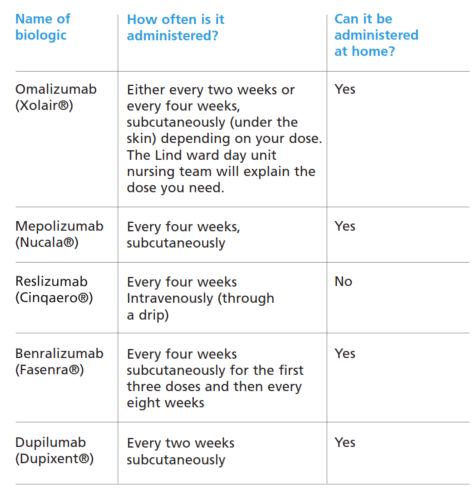What are biologic treatments?
Biologic treatments are also known as monoclonal antibodies. They can help patients control certain types of asthma better. They work by targeting and blocking specific pathways of inflammation in severe asthma. This in turn reduces asthma symptoms such as chest tightness, shortness of breath, sputum (mucus, phlegm) production and wheezing.
Biologics are ‘add on’ treatments. These are treatments patients take in addition to their inhalers.
How do you identify if a patient is suitable for biologic treatment?
Patients are asked to come to Royal Brompton Hospital for a Systematic Assessment of Refractory Asthma (SARA), or an outpatients appointment, where the healthcare team will carry out a number of tests to assess asthma symptoms, and identify the type of asthma the patient has.
Once we have the results of the tests, they are discussed as part of the patient case at a multidisciplinary team (MDT) meeting. An MDT meeting is a meeting where a number of specialists in a healthcare team come together to review patient cases and treatment plans.
The MDT will review the results and co-morbidities against national NHS guidelines, before recommending an appropriate treatment. If further tests are required, they will be arranged accordingly.
Once a treatment plan has been confirmed, patients will come to our Lung and Heart Day Unit (LHDU) to start their biologic treatment.
Biologic treatments guide
The table below outlines the types of biologic treatments you may be offered.

How are biologic treatments given?
The asthma clinical nurse specialist (CNS) team on the lung and heart day unit (LHDU) will help administer your biologic treatment. Some biologic treatments can eventually be administered at home, when you feel comfortable.
When you arrive for your first biologic treatment, a member of the team will explain how the treatment works. They will also talk you about possible side effects and answer any questions you have.
The majority of treatments outlined in the table above (see 'biologic treatments guide') are given as a subcutaneous injection (under the skin). Only one biologic treatment is given intravenously (through a drip). You will be asked to stay on the day unit for two hours after each treatment for the first three appointments.
While you are receiving biologic treatment, you will still need to be reviewed in the severe asthma clinic every six months.
Asthma is a common lung condition that causes occasional breathing difficulties. There is no cure for asthma but in most sufferers, available treatments keep their symptoms under control.
Contact us
Lung and heart day unit
If you have any questions about your treatment or care on the lung and heart day unit, please call us.
Phone: 03301 288 308
Monday to Friday, 8:30am to 7pm
General queries and advice
If you have any questions, please contact the asthma nurse specialist team or the asthma secretaries.
Phone: 0330 128 8043
Asthma nurse specialists email: gstt.asthma.rbh@nhs.net
Asthma secretaries email: gstt.asthma.allergy.admin-rbh@nhs.net
